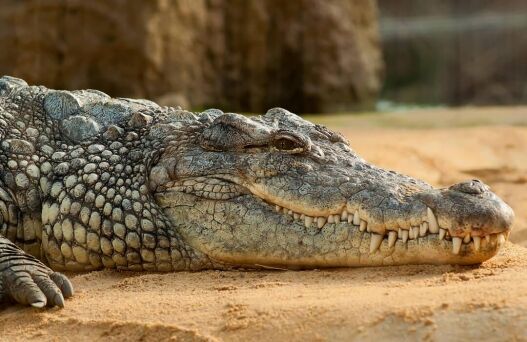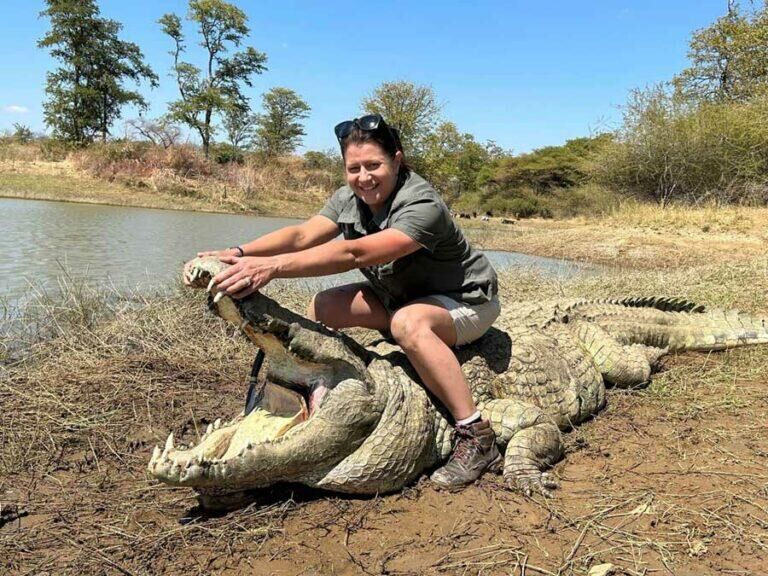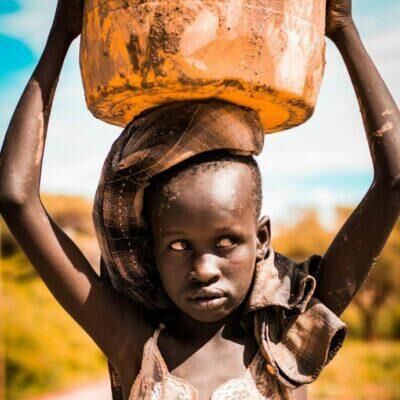
The crocodile population of Mozambique consists primarily of the Nile crocodiles which are widespread through the main river systems of the country, most notably the Zambezi, Limpopo, and Rovuma rivers. In addition, crocodiles inhabit wetlands, floodplains, and lakes.
The vast and largely inaccessible habitats of the crocodile, plus the fact that they spend much of their time underwater, make it almost impossible to estimate the population numbers. Nevertheless, surveys have been conducted in the more densely populated areas, and it is considered that, while the population appears stable in the protected areas, it is at risk in areas more populated by humans.
The threats to the crocodile include long-term effects of agricultural expansion, infrastructural developments, pollution, and changes in water quality, as well as the inevitable human-wildlife conflict, illegal hunting, and trade. To counter this the Mozambique government has implemented laws and regulations to protect crocodiles, with strict rules regarding sustainable hunting and trade.
Community involvement plays an important role in conserving the crocodile population. Community-based initiatives to provide alternative livelihoods and education about the crocodile’s ecological importance have positively impacted the human-wildlife conflict.
The crocodile population of Mozambique consists primarily of the Nile crocodiles which are widespread through the main river systems of the country, most notably the Zambezi, Limpopo, and Rovuma rivers. In addition, crocodiles inhabit wetlands, floodplains, and lakes.
The vast and largely inaccessible habitats of the crocodile, plus the fact that they spend much of their time underwater, make it almost impossible to estimate the population numbers. Nevertheless, surveys have been conducted in the more densely populated areas, and it is considered that, while the population appears stable in the protected areas, it is at risk in areas more populated by humans.
The threats to the crocodile include long-term effects of agricultural expansion, infrastructural developments, pollution, and changes in water quality, as well as the inevitable human-wildlife conflict, illegal hunting, and trade. To counter this the Mozambique government has implemented laws and regulations to protect crocodiles, with strict rules regarding sustainable hunting and trade.
Community involvement plays an important role in conserving the crocodile population. Community-based initiatives to provide alternative livelihoods and education about the crocodile’s ecological importance have positively impacted the human-wildlife conflict.
Sustainable hunting forms an important component of wildlife conservation efforts, including the conservation of the crocodile populations in Mozambique.
How sustainable hunting is helping conservation:
The effective management of sustainable hunting requires data-based quotas and continuous monitoring. Strict regulations are in place, which stipulate hunting seasons, areas, and hunting methods used. Law enforcement needs to be effective in combating illegal hunting and trade. Protecting and restoring the habitats is vital to ensuring that wildlife populations can survive and thrive.

Most hunting enthusiasts are committed to conservation and, through their experiences, can educate others about the value added by sustainable hunting to conservation. They are invested in following ethical hunting practices and value their ability to contribute to conservation efforts.
When properly implemented, regulated hunting offers several benefits to crocodile populations. For example:
Examples of successful conservation outcomes through sustainable hunting
When implemented effectively, sustainable hunting can lead to successful outcomes. There are several success stories from around the world, and one of those is Mozambique’s Crocodile Management Plan.
This management plan includes regulated hunting to control population sizes and at the same time generate revenue for conservation.
Sustainable hunting has resulted in effective population control of Mozambique’s crocodiles, thus reducing human-crocodile conflicts, and ensuring the long-term sustainability of the species. The hunting permits are used to support conservation efforts and the local communities, which has resulted in a positive change of attitude towards crocodiles.
The strengthened monitoring and enforcement efforts, largely funded by sustainable hunting, have effectively reduced illegal hunting and poaching.
There are a few successful conservation programs around the world that have been funded by sustainable hunting. They include:
The collaboration between hunters, local communities, and conservationists is the perfect recipe for the success of any conservation effort. By using the unique strengths and resources of each group success is almost guaranteed.
In the case of Mozambique’s crocodile conservation, the strategy was to have inclusive planning, whereby the community members were involved in developing the conservation plans to ensure their perspectives were considered. Benefit sharing ensured that revenues from regulated hunting and ecotourism be shared with the local community thus incentivising their continued support and involvement.

Maintaining a balance between hunting and conservation presents several significant challenges that require careful consideration and strategic planning. One of the foremost challenges is the need for reliable systems to monitor animal populations accurately. These systems are essential to ensure that hunting quotas are based on precise and up-to-date data, preventing overhunting and aiding in the sustainable management of wildlife populations.
In addition to accurate data collection, the conditions of animal habitats must be closely monitored. Regular assessments and restorative actions are necessary to maintain and improve habitat quality. This vigilance helps mitigate negative impacts on the ecosystem, ensuring that it can support diverse wildlife populations.
Comprehensive environmental assessments play a crucial role in this process. These assessments help identify any unintended effects on non-target species and overall biodiversity, allowing for informed decision-making and the implementation of corrective measures when needed. Such assessments are vital to preserving the ecological balance and maintaining healthy ecosystems.
Funding is another critical challenge in achieving a balance between hunting and conservation. It is essential to secure financial support from various sources, including ecotourism and community-based projects. This approach reduces over-reliance on hunting revenue and provides a more sustainable financial foundation for conservation efforts. Transparency in revenue sharing is also vital. Involving local communities in decision-making processes ensures fair distribution of revenue and fosters trust. By including community members in these discussions, conservation programs can gain local support and participation, which are crucial for their success.
Conservation initiatives must respect and incorporate local traditions, offering tangible benefits to the communities involved. This cultural sensitivity helps build trust and encourages active community engagement in conservation efforts, ultimately leading to more effective and sustainable outcomes.
Despite these challenges, a unified and transparent approach can lead to greater success in balancing hunting and conservation. Collaboration among stakeholders, clear communication, and a commitment to sustainability are essential components of achieving this delicate balance.
The conservation of crocodiles in Mozambique is one of the several success stories involving sustainable hunting. I can only imagine the thrill of the hunt for this wily creature – a very different hunting approach from any of the other species on the hunter’s bucket list.
Game Hunting Safaris is committed to sustainable hunting and to ensuring that you are teamed up with an outfitter who will give you the experience of a lifetime. You’ll be guaranteed excellent service by booking your hunt through Game Hunting Safaris. Give them a call.
Happy Hunting!
For hunting enthusiasts, now is the perfect time to embark on a thrilling pursuit of one of Africa’s most formidable trophies. Whether you are drawn to the excitement of crocodile hunting in Mozambique, or wish to explore the vast opportunities presented by Mozambique’s diverse wildlife, participating in this hunting season supports essential conservation efforts. Discover the excitement of crocodile hunting in Mozambique and contribute to the preservation of its magnificent wildlife while enjoying an unparalleled hunting adventure.
Search from our range of Hunts across various popular destinations in Africa.
Find A Hunt